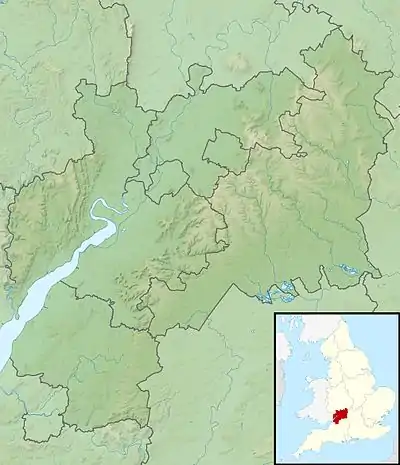Wick Court, Arlingham
Wick Court, Arlingham, Gloucestershire, England is an country house constructed between the late 14th and the mid-17th centuries. Now a base for the charity Farms for City Children, it operates as a traditional livestock farm providing experience of country life for children from urban areas. Wick Court is a Grade II* listed building.
| Wick Court | |
|---|---|
.jpg.webp) "a remote and almost unaltered example of an Elizabethan house" | |
| Type | House |
| Location | Arlingham, Gloucestershire |
| Coordinates | 51.7923°N 2.3845°W |
| Built | 14th-17th centuries |
| Architectural style(s) | Vernacular |
| Governing body | Farms for City Children |
Listed Building – Grade II* | |
| Official name | Wick Court, with railings and wall to north |
| Designated | 10 January 1955 |
| Reference no. | 1090581 |
Listed Building – Grade II | |
| Official name | Barn at Wick Court and adjoining animal shelter to east |
| Designated | 9 December 1986 |
| Reference no. | 1152698 |
 Location of Wick Court in Gloucestershire | |
History and description
The Pevsner Architectural Guide, Gloucestershire: The Vale And The Forest of Dean suggests that the earliest part of the court, the south front, dates from the late 14th century. The house was remodelled and enlarged in the mid-17th century, probably for a Thomas Yate.[1] The site is moated and Historic England records that the court was used as a fishing lodge used by the Lords Berkeley and may have been visited by Elizabeth I.[2] In the 20th century, the court was purchased by the charity, Farms for City Children founded by Clare Morpurgo and her husband, the author Michael Morpurgo.[3] Wick operates as a small-scale traditional livestock farm.[4][5]
Pevsner describes the north front of the house as the "show" front. It is of five bays and three storeys, with a two-storey porch.[1] The top floor of the house was planned as a long gallery, a common Elizabethan feature, but this was never completed.[1] The Historic England listing record for the court, which notes its Grade II* designation, describes Wick as "a remote and almost unaltered example of an Elizabethan house".[2] The barn and animal shelter to the east of the court has its own Grade II listing.[6]
References
- Verey & Brooks 2002, p. 151.
- Historic England. "Wick Court, with Railings and Wall to North (Grade II*) (1090581)". National Heritage List for England. Retrieved 21 June 2020.
- "About us". Farms for City Children. Retrieved 21 June 2020.
- "Wick Court". Farms for City Children. Retrieved 21 June 2020.
- Jarvis, Katie (16 July 2018). "Wick Court, Arlingham: The farm that grows children". Cotswold Life.
- Historic England. "Barn at Wick Court and Adjoining Animal Shelter to East (Grade II) (1152698)". National Heritage List for England. Retrieved 21 June 2020.
Sources
- Verey, David; Brooks, Alan (2002) [1970]. Gloucestershire 2: The Vale and the Forest of Dean. The Buildings of England. Yale University Press. ISBN 0 300 09733 6.